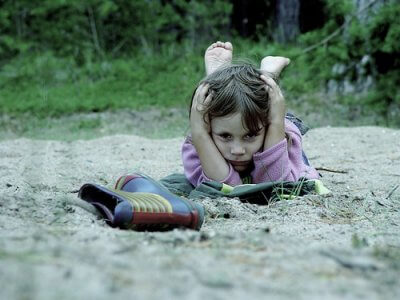“Why Don’t My Kids Respect Me? “

By: Rolands Lakis
by Andrea M. Darcy
Feel like you have long lost control when it comes to parenting? Always asking yourself lately, ‘why don’t my kids respect me?”
Why don’t my kids respect me?
Sometimes we can get so overwhelmed by the responsibility of parenting, or so caught up in the latest parenting trends, that we can lose touch with the basics.
Respect between humans tends to follow the same rules, regardless of age or dynamic. Our kids (or our teens) lose respect for us for the same reasons a colleague or friend would. Or for the same reasons we don’t respect others. We have stopped listening and connecting, we are acting inappropriately, or we aren’t being upfront and honest.
1. You have unclear boundaries.
Personal boundaries show others what we will or won’t accept, and how we will or won’t let someone treat us. If we set a boundary but then demonstrate otherwise, we can’t expect the other person to believe in or respect the boundary.
And when it comes to boundaries with our kids, we need to live them out across our life, not just with our children.
For example, if you say you don’t accept dishonesty from your kids, but then let your partner clearly and constantly lie about his whereabouts? Or you lie over the phone to your boss, in front of your kids? You have shown your children you don’t respect your own boundary, so why should they then respect it?
2. You are being inconsistent.
You threaten they will get no dessert after dinner if they don’t clean their room. And then there you are, giving them dessert. You promise you will be on time to pick them up for school. But are constantly late. These sorts of little inconsistencies add up, and can lead to a child losing respect for you.
This calls into question coparenting. It’s very important that you parent on the same page, even if you have different parenting styles.
The second you set up one parent as ‘good cop’ and the other as ‘bad cop’ you’ve created space for disrespect. And note that your parenting decisions are between you and the other parent, and should not be hashed out in front of your children.
[If you struggle to communicate and agree, don’t overlook the power of couples counselling to help with parenting.]
3. You are forgetting they aren’t you.
 Remember, your children are independent, separate humans. They are not an extension of you, no matter how much they might seem like you.
Remember, your children are independent, separate humans. They are not an extension of you, no matter how much they might seem like you.
If you are not seeing or hearing your child for who they are, they might at first aim to please you and be the ‘mini you’ you so desire. But as they grow up then become an adolescent this turns into lack of respect and anger, as they quite rightly try to forge their own identity.
4. You’ve stopped listening to how your kids feel.
Children often aren’t so worried about exactly what did or didn’t happen. They just want their parent to acknowledge how they feel. Yes, even if to you, as an adult, their feelings seem silly or easily solvable.
In their book, How to Talk so Kids Will Listen and Listen So Kids Will Talk, authors Adele Faber and Elaine Mazlish point out how quickly most parents deny their kid’s feelings, burying their kid’s attempt to share under advice, or a pile of questions.
Our kid comes home and declares, “I didn’t like the sleepover”. And our first response is, “Of course you did! You are just shy. Didn’t you watch a nice movie? Have popcorn? Weren’t the girls you like there? Next time you just need to speak up more and not let your shyness get in the way.” Our child gets increasingly upset or shuts down.
Meanwhile, if we just encouraged our child to continue with a “Mmm hmmm, okay..”. Or reflected back and helped them clarify their emotions, “You didn’t like it? You don’t feel happy?” We allow our child a chance to vent. They feel seen and respected, and next thing they are telling us themselves what went well, and are feeling better.
5. You are acting out lately.
It’s not just children who act out. Parents can do so, too. Particularly if you are going through a tough time and haven’t found a healthy outlet for your stress.
If you lately ‘set boundaries’ only when you are screaming and in a rage, if you insult your children when you are stressed, or slam doors and block them out for hours on end? This is all adult temper tantrums. And your children will not feel safe, or might even be afraid of you.
Parenting can be tough. We all occasionally crack and say or do stupid things. But constantly doing so is a sign you need help and support for your own issues, before your children lose any and all respect for you.
6. You are being dishonest or manipulating.

photo by Kelly Sikkema
Perhaps we can get away with it when our children are very small. But eventually, children realise when their parents are hiding things, or blackmailing them. They might go along with it, to keep you happy, or because they want what you are promising.
But just like you wouldn’t respect a boss who manipulates you to get what they want, or a colleague who always lies instead of taking the time to talk to you? The price of this sort of parenting shortcut tends to be children who don’t respect you.
And it will all come out when they are a teen and start reminding you you have no grounds to ask them to be honest, when you haven’t been.
7. Your expectations are unfair.
Wanting our children to do well and pushing them to do their best at what matters to them is one thing.
Pushing a child constantly is another, as is pushing them to do things that are beyond their capacity, or far outside their interests. This is actually a sign of disrespect for your child.
Do you really pay attention to who your child is? What matters to them? What their interests are, they skills? Their struggles and limits? Or do you have an idea of who your child should be and work to push them to be that person you want them to be?
A study published by the American Psychological Association using a sample of over 3,500 secondary students “found that high parental aspiration led to increased academic achievement. But only when it did not overly exceed realistic expectation. When aspiration exceeded expectation, the children’s achievement decreased proportionately.”
I’ve left it all too late….
Children do not need perfection. They need a parent who is present and doing their best.
It’s never too late to step it up as a parent. It goes back to being honest. Admit to your child you have made mistakes as a parent (it’s not like they won’t have noticed) and that you are now going to make changes. Then be clear with what those changes are, and consistent with putting them into action.
And remember, again, that respect is universal. The more you take the time to see, listen to, and respect your children for the unique and wonderful human beings they are, the more they will respect the parent they can see is doing their best and really cares.
Can’t seem to be consistent with your parenting? Being a parent brings all our own issues to the surface, and sometimes we need support. We connect you with top London-based talk therapists who can help. Or use our booking site to find UK-wide registered therapists now.
Andrea M. Darcy is a health and wellbeing expert, who has done some training in person-centred counselling and coaching. She often writes about trauma, relationships, and ADHD, and advises people on how to plan their therapy journey. Find her on Instagram @am_darcy




